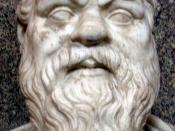Socrates was a great Greek philosopher whose ideas and teaching methods are still known and used even until this day. He was born around 470 B.C., in Athens and was a stonecutter and Athenian soldier before he became a teacher. He first learned his father's art, but later dedicated himself to thought and to philosophic teaching without compensation, in spite of his destitution. He was one who questioned all the generally accepted ideas of Athens but demanded standards of truth and reason.
Socrates instructed by what is now known as the "Socratic method". He educated his students not by memorization but by asking questions. He advised the population to find their own answers to their questions and query their elders. Socrates wanted everyone to investigate and question things like politics, and more specifically, democracy. Furthermore, he concentrated all his attention on the search for moral ideas and values; he was convinced that the practice of morals and ethics must come first before justice could come through.
He was opposed to that damaging idea which was the basis of the Sophists teachings.
Many of the citizens of Athens, including the Sophists, did not like what Socrates was teaching. Socrates was indicted of denying the gods recognized by the state and introducing instead of them strange divinities and of corrupting the young. In truth, he really believed in the gods, he was just questioning them.
However, he was brought to trial in front of 501 jurors. Socrates said it was his conscience that made him teach and as long as he lived, he would keep teaching. He even asked the state for a pension for all his years of service. Declared guilty by a small majority, sixty votes, he stood with resolute spirit before the trial, and was condemned to death.
In my opinion, Socrates was honorable in drinking the poison to his death. He had to take the hemlock, which was the least painful way to die compared to other options. If he lived and escaped somewhere else, he might have faced a far worse death. Most citizens in Athens did not approve of his teachings and there was a very high chance that he would not have had survived long. By dying then, and drinking the hemlock, he would not have to endure more unnecessary pain.
Socrates was already seventy years old when he was put on trial. By our standard, that was quite old, in Athenian timers, he was already way past his due date. Eventually, he was going to die and in all likelihood, sooner. By dying in front of the population of Athens, he was defending his work and going for his cause. His followers already had an escape plan ready for him to leave any moment. Socrates refused, however, declaring that he did not wish to fail at any cost in obedience to his country's laws.
I think that Socrates made the correct decision in the end. I think the main reason he was correct was that he was defending his work. By dying for his teachings and what he believed in, he was sending out the message that he was justified. If he had taken the other way, the easy way out and escaped, Socrates would have had seemed like a hypocrite. The public were more likely to follow his teachings because he felt so strongly about them. He probably even gained more followers by taking his death sentence; he was a martyr for the right to think.
Even until the last moments of his death, Socrates calmly explained the flaws in the reasoning of the Sophists. Individuals today know what he said in his last moments. If he had run away, many followers could have had lost their respect for him and start to question his morals and values. Socrates was a great thinker and was ahead of his time. He was simply at the wrong place in the wrong time.
It is not a question of what we would do; it is what Socrates should have done. Socrates disregarded to defend himself and thus made compromises to the judges to the point of humiliating himself before them, more or less excusing his actions. Socrates could see, not a practical acquittal for his earthly life but, rather, the eternal judgment of reason for immortality. He preferred death to living.
Although we will never know, I truly feel that Socrates taking his sentence is what made him so revered. Today, we recognize Socrates as one of the greatest philosophers that ever lived. It is because he led such a fulfilling life even to the very end. It is because he stood his ground in what he firmly believed in. It must have been hard to face the death sentence, but he strongly stood firm. He was Socrates and he died for his beliefs.


